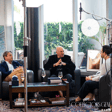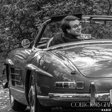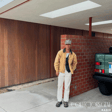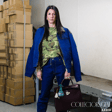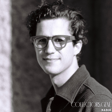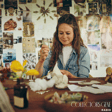Introduction to Collector's Gene Radio
00:00:00
Speaker
I love listening to people talk about what they collect. If someone says, let me tell you about my kids, I'm like, no, that's okay. Someone's like, oh my God, I want to share pictures of my dog going, I have a dog, not so much. But if they say, you know, I collect lead soldiers and a funny thing happened, I'll be like, let me hear the story because that's going to be great and I'm really going to like that. What's going on, everybody? And welcome to Collectors Gene Radio.
00:00:23
Speaker
This is all about diving into the nuances of collecting and ultimately finding out whether or not our guests have what we like to call the collector's gene. If you have the time, please subscribe and leave a review. It truly helps. Thanks a bunch for listening and please enjoy today's guest on collector's gene radio.
Meet Nicholas Lowry, Vintage Poster Specialist
00:00:43
Speaker
You might recognize today's guests from the ever popular show, Antiques Roadshow.
00:00:48
Speaker
Nicholas Lowry isn't just the vintage poster appraiser for the hit show. He's also the president, principal auctioneer, and director for vintage posters at Swann auction galleries. And for all intents and purposes, he's a collector. Nico grew up around collectors and his family still runs one of the oldest bookshops in New York to this day. After a stint in Prague, he found himself falling in love with vintage Czech posters and well, the rest is history.
00:01:13
Speaker
Vintage posters is a new category to Collector's Dream Radio, so I really had a lot of questions to understand the market a bit better. Unlike most collectibles, there isn't really a modern version of the category today, making these vintage posters even more rare as time goes on. Lowry's a collector of many things, but with a busy schedule, I was curious to find out how in the world he has time to collect anything. Full of life, stories, and knowledge, please enjoy. This is Nicholas Lowry for Collector's Dream Radio.
The Evolution of Collecting and Swan Galleries
00:01:44
Speaker
Nico, so excited to have you on Collector's Dream Radio today.
00:01:48
Speaker
Cameron, I'm excited to be here. You know, I think a podcast is a, is a curious medium for people who collect visual things, but I think we can paint a great picture and make this work. That's the goal. That's the goal for sure. You hold many titles. So let's run through them real quick. You're the president and principal auctioneer for Swan galleries. You're the director of the vintage posters department there. And you're also a poster appraiser on antiques, roadshow, and for all intents and purposes, a collector.
00:02:17
Speaker
That is correct. Can I add two more things to that list? I would love that. I have also recently curated a major museum exhibition here in New York City at Poster House Museum, which is America's only museum dedicated to the art of the poster. And it's an exhibition of the history of New York City travel posters. It's called The Wonder City of the World.
00:02:38
Speaker
There's also been a book published, which I helped write in conjunction with the exhibition, so I'm going to add curator and author to that list. Amazing. I may add one more thing. I infrequently get a chance to toot my own horn, so forgive me. Please. I'm wrapping up a project that I've been working on for about two years now, a project of all places in Czechoslovakia, and you'll hear more about this a little bit later.
00:03:02
Speaker
more or less a documentary on the history of Czech graphic design. Amazing. Well, I'll be sure I link everything up so there's a place for everyone to go check all that out.
00:03:12
Speaker
How did we get to vintage posters since you were surrounded by rare books for most of your childhood? I grew up in a family of antiquarian book dealers. My grandfather opened an antiquarian bookstore in New York in the 1930s. His wife, my grandmother, went to work there. They had three daughters, one of whom was my mother. Those three daughters still work there. My brother now works there. My cousin works there part-time.
00:03:39
Speaker
And that same grandfather started an auction house, Swan Galleries, with his nephew Benjamin Swan in 1940. My father took over that in 1969 when I was a child. So I basically grew up in a family of antiquarian book dealers. Everyone in my family had a different area of specialty.
00:03:56
Speaker
And when it came time for me to explore the idea of going into the family business and Cameron, I put that off as long as I could. I went to the bookstore and I didn't really want to work with modern first editions because my mother did that. And I really didn't want to work with antique maps because my grandmother did that. And I really didn't want to work with autographs because my father and my aunt did that. I didn't want to work with medical books because my other aunt did that.
00:04:25
Speaker
But there was a room at the bookstore that was filled with World War I and World War II propaganda posters that my grandfather had just collected over the years and done nothing with. And I was like, I'll take a stab at those, I guess. And I mean, in my telling of the story, I went into that room and I emerged six months later, an absolute poster fanatic in love with the medium and a nascent master in the history of what was being represented there.
00:04:55
Speaker
Pretty fascinating. How has the bookstore evolved since its inception in the 30s? Well, the great thing about the bookstore is it has not evolved very much. And I say that endearingly. The bookstore is one of the great anachronisms of New York. It's like walking into another past century or certainly past decades. It's very old fashioned. If you like Barnes and Noble, you won't like this bookstore because it has that beautiful, musty smell. It has beautiful items and beautiful antique prints and paintings everywhere.
00:05:23
Speaker
I'm so has not changed hasn't changed very much at all it's delightfully similar to how it used to be. And so you immerse yourself in these vintage posters and you kind of become obsessed in a collector yourself how is the market for vintage posters evolved over the years particularly in this age of digital media and online auctions.
Impact of the Internet on Collectibles
00:05:44
Speaker
Yeah, I mean, so the great question because I got involved. I've been doing this now since the late 1990s. So, you know, we're coming on almost 30 years of doing this. I began in the days before the internet. I began in the days before full color printing. So some of my earliest catalogs were primarily done with black and white photographs that I took on a 35 millimeter camera.
00:06:06
Speaker
So the market changed a lot with the advent of internet and then has continued changing as the internet they say the internet is here to stay i guess i believe that it's not going anywhere right so with the internet what's what's really happened and i suspect you heard this from other people talking about other areas what was once perceived to be rare.
00:06:25
Speaker
has surfaced in many more places than people previously thought. They used to find dealers who said, this is very rare, one of a kind, this or that. Now, all of a sudden, with the internet, they're popping up on eBay, they're popping up on Etsy, they're popping up on Artsy, on Cherish, and all these different places. So with that, over time, there's been a great leveling of prices. So posters, they're not unique items. They're not like oil paintings or contemporary art paintings. They were printed as multiples.
00:06:52
Speaker
And when you have something that's printed as a multiple, you really can chart its value. There's a blue book, almost a blue book value for these things, unless you come to the ones that are particularly rare or particularly scarce. And then, like with any good collectible, there is no real guideline to how high they'll sell.
00:07:10
Speaker
I would have to assume like anything that's collectible, right? There's trends over time of what's hot and what's not. You've been doing this for so long. I'm curious to know if you've seen any notable trends that are worth talking about in the vintage poster market that you've
Trends and Themes in Poster Collecting
00:07:25
Speaker
seen over time. I certainly have. I've seen a lot of visible trends worth talking about. They're worth talking about because by their very definition and their very nature, trends don't last. And so, you know, never invest or never bet on a trend because you'll end up coming up short. I'll give you,
00:07:40
Speaker
Two very solid examples. In the late 1990s, early 2000s, one of the hottest things out there were cigar bars and cigar smoking. And there was cigar fishing on a magazine.
00:07:55
Speaker
All of these movie stars, Arnold Schwarzenegger, I remember, I must've been countless others who were prominent cigar smokers and people started building smoking rooms in their homes or cigar rooms and they would decorate these rooms with vintage cigar posters from the 1920s and 30s from Switzerland and from France. Just these wonderful images. Some were very art deco, some were prominently featuring men smoking cigars. They really evoked a style
00:08:25
Speaker
And the price of these cigar posters went through the roof as they were so trendy.
00:08:32
Speaker
And then the world began to realize that cigar smoking was kind of stinky and not very fashionable and not healthy at all. And literally, we were selling cigar posters for pennies on the dollar, you know, six, seven, eight years later. Wow. We watched the price boom, and then we watched the price bust. And the other example, forgive me, I don't remember the exact date, I should know this, but when the Titanic movie came out, you know, the Capri on Kate Winslet,
00:08:59
Speaker
Huge, huge international attention was paid to the Titanic. Titanic collectibles have always been incredibly collectible and they always will be incredibly collectible. But after the movie came out, there was so much interest on the Titanic that prices spiked significantly higher than they were already trending. Specifically, I was at an auction at Christie's, if I can say that name out loud. Yes. It was a movie poster auction and there was a signed
00:09:28
Speaker
Titanic movie poster signed by Leo, signed by Kate. And sitting in front of me was a father and daughter, and the little girl kept pulling on her father's sleeve saying, I want it, Daddy. Bid more, bid more, bid more. And while I don't remember the exact price of this $100 poster, it sold for around $8,000 or $9,000. Wow. Because little children around the world, one of them was literally right in front of me, were cajoling their parents to buy them a souvenir of the movie.
00:09:57
Speaker
So that was a trend. And if that little girl who now must be in her 30s, I would think late 20s or 30s, if she ever tried to sell that, I think she would be sorely disappointed with the results. I would have to imagine.
00:10:10
Speaker
When it comes to hosting auctions at small galleries, especially when it comes to vintage posters, are you doing them as, are they more thematic or is it a mix of thematic poster auctions from a specific period or from a specific artist? And do you do auctions kind of with just a whole smattering of stuff and a bunch of different lots?
00:10:31
Speaker
Historically and traditionally poster auctions have been a smattering from A to Z, from the 1890s through the 1980s, everything in the kitchen sink also sold at once. And at Swan, we have done that for the entire duration of my tenure here. But then we realized there were different ways to approach marketing as material. So in the year 2000, we began holding rare and important travel poster auctions where we would feature impressive and seldom seen examples of travel posters.
00:11:02
Speaker
We've been doing that auction ever since, so now in its 25th year, immeasurably popular and immeasurably successful. So that really helped by breaking them out. We've also held other auctions of modernist design, sort of graphic design posters. When collections come along, we once held an auction of the entire works of a single French art deco artist named Roger Broders. So one of the great things from my point of view, and I hope from my client's point of view,
00:11:30
Speaker
of a small auction house like Swan is that we are nimble and we can change things very quickly. So if someone comes to us with a collection,
00:11:39
Speaker
we can mount an auction of that collection, even if it means changing our schedule. So for example, coming up in just two weeks now, we have a private collection of tennis and sports posters from a family in Chicago that owned a string of tennis clubs and sports clubs, decorated the walls of their facilities with these images. Now they're selling, and so we have just this unparalleled collection of sports posters, and it's super focused and super exciting. Love that. I have to check that out.
00:12:07
Speaker
As a collector yourself, what criteria do you personally look for when acquiring
Nicholas Lowry's Personal Collecting Philosophy
00:12:13
Speaker
posters? Are you a conditioned guy? Are you a rarity guy? Or is it kind of just what meets your eye?
00:12:19
Speaker
I am a what meets my eye kind of guy. My personal collection is posters from Czechoslovakia, now known as Czechia. My father was born there. That's my connection to the country. I lived there for four years in the early 1990s after I graduated college. And my father and I together collect Czech posters.
00:12:42
Speaker
I like to say it's the largest collection of Czech posters in the world outside of Czech museums, and I like to say that because nobody knows how to contradict me. I'm not even sure it's true. I just say it because it sounds good. No one's going to say no to that. That's right. Who's actually counted? Who knows? Right. With any posters, whether it's something at Swan, whether we're organizing an auction, or whether it's my own collection, what I'm always thrilled with
00:13:08
Speaker
to the point where I trust your listeners will understand, but someone who's not a collector won't understand the thrill of seeing something they've never seen before. I mean, hand shaking, palms sweating, heart racing, that really, for lack of a better term, really turns me on.
00:13:25
Speaker
And so for my collection itself, when I see something I've never seen before, that's what gets my attention. And certainly the area of check poster collecting is not so advanced. If I were to find something wonderful in bad condition, I would buy it automatically because I wouldn't be sure if I would see it again in good condition. So I don't even have that luxury of being so condition focused.
00:13:47
Speaker
When you say something that you've never seen before, is that more so along the lines of something that you didn't know existed or something you knew existed, but you've never had it kind of come across your desk? Well, as a collector, I get excited about both of those things. But specifically, if I've seen something in a book that I know is rare and I come across it, I'm very excited. But if I see something in real life that I've never seen in a book,
00:14:11
Speaker
And it's good. And I say, how can this incredible image not be recorded? In fact, we've come up with a term for our auction catalogs, which is previously unrecorded, which basically means we've looked and we haven't found a picture of it.
00:14:27
Speaker
And that's not an exhaustive search, to be fair, but it certainly is more than just Googling something. We have a lot of reference books in a big reference library that we go through. But to find something that's previously unrecorded, you know, it's like an explorer stumbling across a new world.
00:14:46
Speaker
So between your positions held at Swan and being an appraiser on Antiques Roadshow for over two decades, could you share some insight into how you value vintage posters? I mean, are there factors that matter more than others? Is it all situational?
00:15:01
Speaker
Well, there's a lot of factors. As I said earlier, a lot of it is finding records of their sale previously. As they are multiples very frequently, but not always, you can find records. So perhaps a poster by Toulouse-Lautrec or Alphonse Mucha, who are very famous French or Nouveau artists,
00:15:21
Speaker
If you were to show me a work of theirs, I could go to my database and find the last five results of those posters within the last few years. And we'd come up with an average price. And then we would look at the condition. So let's say average price is $20,000. Then we look at the condition. If the condition of the poster you have is very good, that number goes up a little. If the condition is quite poor, that number goes down. We'd have to look at whether the colors are faded and so on.
00:15:51
Speaker
Frequently, I'd say this is not so much a specific value in question, but a lot of times people reach out to us with posters that could be quite valuable and appear to be quite valuable, but are reproductions. So really the first step in figuring out a poster's value is to make sure it's authentic. Are there any memorable moments from Antique Rocha where you couldn't believe what someone had put in front of you?
00:16:14
Speaker
The most thrilling moments of the Antiques Roadshow I didn't realize were thrilling when they happened. But in retrospect, I realize how great they were. One in particular, a fellow came in with a collection of original artwork by an American train illustrator named Burn Hill, B-E-R-N-H-I-L-L. And as I recall, this fellow had worked for the railway.
00:16:38
Speaker
And these were being thrown out, not an uncommon story. And he saved them from the dumpster. And these were among the best American mid-century modern slash art deco renditions of trains. And it's funny, I didn't, I loved them when I saw them and I said to myself, I've never heard of this fellow, blah, blah. I think they're great. And I think this is what I think they're worth. And then as a result of that show being broadcast,
00:17:03
Speaker
people started coming to me with the posters. And so it really set an entire renaissance for this artist, which was just extraordinary. So that was one of the real highlights for me. So in that situation, something that you were unaware of before, how do you value something like that fairly, knowing that it's obviously got some rarity to it and it's kind of a nuanced situation?
Valuing Vintage Posters
00:17:30
Speaker
How do you value something that you've never seen before?
00:17:33
Speaker
First of all, we make it look easy. So I'd love your listeners to understand that it's not necessarily that easy. A lot of factors come into play. The first is trying to identify similar items by different artists. So if you have a train, a very graphic train image from the mid-1950s that you've never seen before by an artist you don't know, you look to other train images from that era as sort of a benchmark. And then there's an X factor.
00:18:02
Speaker
which is more guesstimation
00:18:05
Speaker
And you always have to be careful with this because it's how nice the image is. And that's a very personal feeling, right? So I am very guilty of saying, oh my God, this is an incredible image. It must be worth $10,000. But then I have to temper my enthusiasm and be like, okay, hold on. You know, let's be realistic. It would be lovely if it was worth 10,000. But realistically, similar pieces have sold for two and a half or 3,000. This one is unusual. So I'd say three to 4,000.
00:18:33
Speaker
So we tie all these factors together, we mix up the ingredients and then we bake the pie and we come out with a final number that we hope will be, not that we hope, that will be representative of the piece's value. But then, of course, the beauty of auction is you get to train people who are equally as enthusiastic as I am and that price could go very high. Is there a pinnacle of poster collecting, maybe something more blue chip and something more grail worthy?
00:19:01
Speaker
The great thing about poster collecting is that everybody has their own niche. So I collect posters from Czechoslovakia. That's very specific. There are some people who just collect movie posters. There are some people who just collect posters of ocean liners. There are some people who just collect magic posters.
00:19:18
Speaker
years ago I knew a woman who only collected images of women with rosy cheeks. That was her collection. Veterinarians will collect posters about veterinarians, former servicemen or women might collect propaganda posters. So I think within each one of those niches there are
00:19:35
Speaker
holy grail images that people would seek out. Maybe things that they've seen in books, like I mentioned before, that they haven't actually been able to find. For me, there are a handful of Czech posters that I have seen in books that I would so desperately love to get my hands on.
00:19:54
Speaker
One poster in particular by an artist named Frantisek Zelenka. It was a car poster from the late 1920s, as I recall, very avant-garde. It was partially photo montage, very graphic. And when I lived in Prague and I was in my early 20s, I was already scouting around trying to find things.
00:20:15
Speaker
Czechoslovakia was emerging out of 40 years of communism. Not a lot of people spent the communist years collecting posters, so there wasn't necessarily a lot for me to find, but there was one dealer, and this dealer had this poster, and he showed it to me, and he knew it was rare, and he knew it was precious, and he told me that it was $4,000. And for a 21-year-old living in Eastern Europe in 1991, the concept of $4,000 blew my tiny little head off, and there was just no way in the world
00:20:44
Speaker
that I could have, A, scrape that money together, but B, imagine spending that on a poster. Now, I would gladly pay $40,000 if I could find it, but I think if I found it, it would cost me more than that. How about modern? Besides movie posters, is there a market for modern posters? Do they even exist? Well, it's a vague word, modern posters.
00:21:09
Speaker
You know, the kind of posters that are being hung in the subway system of New York right now probably don't have a great collecting market. But certainly from as late as the 1990s and early 2000s, there are a handful of designers that people really seek out. A man named Paul Rand, who was a graphic designer and designed the famous IBM logo and another number of other famous logo types. So people seek out the work of famous designers. But generally speaking, there is not
00:21:39
Speaker
Certainly in my world, not a great market yet for contemporary posters. Let's say contemporary as opposed to modern. That's a better word. I'm curious to know we're seeing this rise in collectibles across multiple different categories and we're seeing new collectors come into all these markets and join these markets as new collectors.
The Emerging Market of New Collectors
00:22:00
Speaker
Are you seeing a lot of upward trend of new collectors in the poster market?
00:22:05
Speaker
We are definitely seeing an upward trend. I wouldn't say it's a steep incline, but posters are incredibly accessible to new collectors who might not necessarily be young collectors, right? I think every dealer's dream is to find someone young, rich, and interested who spends the rest of their life spending money on their product. But every auction we have, somewhere between 10 and 15% of the participants are new to the company.
00:22:32
Speaker
They may not all be successful buyers, right? Somebody might jump in and place a bid but not win. So about 10 to 15% of our clients for every sale are new to Swann. And that's really sort of a heartwarming number because it implies- It's a very strong number.
00:22:47
Speaker
Yeah, and it just implies that there's hope for the future. And a lot of people say that the younger generation doesn't collect as much as the older generation. And I do think that's true, but I do think too that posters really do resonate a lot more with some people than other areas of collectibles.
00:23:06
Speaker
Where would you say is a great place for someone to start collecting vintage posters? Of course, this is all subjective to personal tastes, but is there a common area for people to look and how can they make sure that they're making informed decisions?
00:23:20
Speaker
So that's always been really tricky. And while the internet has been a great leveler of prices, it's also been a great diffuser of inauthentic and fraudulent pieces. There is a wonderful organization called the International Vintage Poster Dealers Association, which abbreviates IVPDA.
00:23:40
Speaker
And the members of the IVPDA are all vetted and they're all legitimate and honest. And if you're thinking of buying a vintage poster, you can actually go to their website, which is IVPDA.com. And all over the world in Europe and even in Asia, you'll find
00:23:59
Speaker
Listed dealers I would recommend starting to look with them I also recommend the best thing to do is to look a lot before you buy because again There's so much out there so many different images and and I trust that You know someone who's enthralled by good graphic design will look through all these offerings and something will grab their eye But when they do decide to buy I would really encourage them to buy from a from a accredited dealer with this association
00:24:29
Speaker
I would have to assume that Swan does auction previews. If someone was interested in a poster from an upcoming auction, they could potentially come and see it if they're in New York. Thank you. I'm very good at promoting other people and probably not so good at promoting my own business. Yes. We have four poster auctions every year.
00:24:48
Speaker
And we also hold 35 other auctions in different fields. But for every auction that Swan has, the catalog comes out about three weeks before the auction and is available online for everybody to see. It's free. A week before the auction, for the poster auctions, all the posters go on display and people can come in and people can look and touch. And it's like a museum where you can actually touch and take things off the wall and eventually buy.
00:25:12
Speaker
Then we hold the auction and people can participate via the telephone, via the internet, they can come in in person. If they're busy on the day of the auction, they can leave us a bid which we will execute on their behalf. And again, buying from a renowned or reputable auction house is another sure way to go because our reputation is on the line and we make sure that the things we sell are kosher.
00:25:35
Speaker
In terms of your personal collecting, is there a memorable moment of finding something special that stands out for you?
Memorable Acquisitions and Personal Collections
00:25:44
Speaker
The memorable moment that stands out for me wasn't one thing special. It was when, through a contact in Prague, I was contacted by a man who had an entire collection of posters
00:25:55
Speaker
that he was trying to sell and this was in the days right after 9-11. So the world was terrified and frozen and a lot of people weren't flying but I flew to Prague several months after 9-11 to visit with this man and I ended up buying the entire collection which was about 170 pieces.
00:26:16
Speaker
and you buy a collection of 170 pieces, you're going to get some dogs. But the heart of the collection was so good and so rare and so exciting. I mean, I can still look at photos of them all today and still get equally as excited as I was the day that I met them. Did those go to your personal collection or was it going to auction? Those all went to my personal collection. Amazing.
00:26:39
Speaker
You get to see a lot of posters, right? I mean, between your time at Swan and Antiques Roadshow, does it ever scratch the itch for you for posters that you thought you wanted to own, but then you got to see them in person and it was kind of enough for you. It wasn't as great as maybe you thought it was. No, that has never happened. What has happened is posters that I have loved at first glance, I've become jaded to their brilliance after seeing them so many times. So one example of that, there's a famous French
00:27:09
Speaker
poster artist named Leonardo Cappiello, one of the best, and he designed hundreds and hundreds of posters, and he had a very comical, in a good way, style, humorous style. He used bright colors, memorable images, and he has two posters that are just exceptionally famous. One that's colloquially referred to as the Green Devil, and it's called the Green Devil because it shows a green devil gleefully cavorting with a bottle of liquor.
00:27:36
Speaker
Moran Kena is the brand. And the other poster is a poster for hats and the company's called Mossant, M-O-S-S-A-N-T. And the poster just shows three hands doffing three hats. And both of these posters were among my absolute favorite images when I got into the business almost 30 years ago. I just could not believe how happy they made me. And then over the years I've seen them.
00:28:03
Speaker
here and there and there and again over there and this auction, that auction, some museums. And all of a sudden I'm like, okay, I still remember how good I thought that image was, but I'm a little jaded now because it's fairly ubiquitous. So that's happened. I've sort of become jaded in that way. A big thing in the poster market is reprinting for better or for worse. Is there still a collectible market for things that have been reprinted?
00:28:30
Speaker
there really is not a collectible market for things that have been reprinted. People appreciate reprints because they're inexpensive. And I've had clients who are like, well, this is a reproduction, but the poster was from the 1890s, but this was reproduced in the 1930s, so it's still an old reproduction. And I'm like, this is my analogy. I say, look, if I make a Xerox of $100 bill for 50 years,
00:28:58
Speaker
It's still a Xerox and it's not a real hundred dollar bill. Like I can't sell it for any more 50 years from now. And that's, that's how I feel about reproductions is they're great for inexpensive decorating, but they will never carry any, any value at all in the marketplace. Makes sense. So posters isn't the only thing you collect. You did a home tour with Homeworthy and the shows, it shows that you collect all sorts of things.
00:29:23
Speaker
being very kind, Cameron. The word you're looking for is hoarder. Well, when you're a collector, you're a collector. From bus, you collect small souvenir buildings and robots. I mean, the list goes on. How do you find time to collect all this stuff? For me, it's sort of a Zen activity that keeps me grounded and everything else. I don't actually know how I find time to do it. I think I probably
00:29:50
Speaker
have an easier time finding time to find a new robot or a new bust than I do actually doing the work that I have to do. But every weekend I go to a flea market, a very funny story. I was visiting friends in England two weeks ago and we walked down Portobello Road on a Monday. Portobello Road is a big antique area in London. And on Monday, most of the shops were closed.
00:30:13
Speaker
In one shop window, I saw this very large bust of a rhinoceros in an admiral's jacket. Imagine like a bust of Napoleon. Instead of Napoleon, it was a rhinoceros in a colorful jacket. It's not real, obviously, and it's not actually an antique, but I was like, you know what? That belongs in my messy apartment. But I couldn't buy it because the store was closed. When I came back to New York, I went online and I found some for sale and I bought them. There you go.
00:30:42
Speaker
I was sitting at my desk. I might even have been eating a sandwich at the time. Rather than just sitting there eating a sandwich, doing nothing at my desk, I was online looking to fill my hoard with more material. I love it. Nico, before we wrap it up with the collector's gene rundown, I have one final question for you. Sure. Please. Growing up around collectors and rare books and people with so much knowledge in such a specific category,
00:31:10
Speaker
How pivotal was this to your career, and was there a moment that you can attribute to all the success you've had today?
The Influence of a Collector's Upbringing
00:31:17
Speaker
Wow. I cannot think of a happier place to be than surrounded by collectors. People are so esoteric in what they collect, and everybody who is a collector is so knowledgeable of their field. I love listening to people talk about what they collect. If someone says, let me tell you about my kids, I'm like, no, that's okay.
00:31:38
Speaker
Someone's like, oh, my God, I want to share pictures of my dog going, I have a dog, not so much. But if they say, you know, I collect lead soldiers and a funny thing happened, I'll be like, let me hear the story because that's going to be that's going to be great. And I'm really going to like that. I don't think there was one pivotal moment for me. It really was a slow drip over years. I mean, family dinners for me growing up were sitting listening to my parents talk. My mother would talk about her day at the bookstore. My father would talk about his day at the auction house. So it was a slow drip.
00:32:06
Speaker
I will tell you this and for all your listeners, if I ever run into any of you who are listening at a cocktail party, A, bring me a drink, B, don't be surprised if I lead with a question. If I ask people, if I'm ever at a loss for conversation, I ask people if they collect anything. And if the answer is yes, I say, oh my God, whatever it is, it doesn't matter. Oh my God, that sounds so interesting, tell me about it. And I'm guaranteed to have an interesting conversation at a cocktail party.
00:32:34
Speaker
So I just, I find that that collectors, that anybody who is passionate about what they do has something worth listening to say. And if someone's going to bring you a drink at a party, what is it?
00:32:46
Speaker
Ah, well, so it really depends. If it's early on in the evening, I would love a vodka martini straight up very dry with a twist. If I've had several of those already, I might switch to a beer or two or three. Easy. Nico, let's wrap it up here with the collector's game rundown. You can answer these questions based on any of the things that you love to collect, whether it's check posters or whether it's small souvenir, buildings, whatever it may be. Sound good? That sounds great. Let's go.
00:33:15
Speaker
What's the one that got away? You know, so far, I'm lucky one hasn't got away. The poster I wanted to buy most in my entire life was at an auction in Prague, and I flew to Prague specifically for this auction, and I went to preview the auction, and it's actually a poster by this same fellow Zelenka, who I mentioned before. This was a poster I hadn't seen before. It hadn't been in any book, so it was previously unrecorded.
00:33:39
Speaker
And I couldn't believe it and I went out the night before the auction and I sat in a restaurant. I remember this to this day. I sat in the restaurant with a list of
00:33:52
Speaker
There were a bunch of things in the auction and I made a list of everything I wanted to buy and I made a list of all the prices I was willing to spend because one of the things about going to an auction is you need to have an idea of your limit because if you go into an auction without an idea of your limit, you can get carried away and it can be crazy. So I was being very strict with myself and I made a limit and I went to the auction the next day
00:34:14
Speaker
and there was only one other person competing against me and I got the poster that I wanted for under my limit. So that was the one that didn't get away, but I was most afraid would get away. How about the on deck circle? So what's next for you in collecting maybe something you're hunting after?
00:34:29
Speaker
I think what's next for me in collecting is to find another area that I haven't explored so much. I mean, I think every collector at some point in their life has to address the question, what's next? Like, what's next? I have hundreds and hundreds of posters. You know, what am I going to do with them? I could keep collecting. I'm not ready to sell them yet. I think for me, the next thing to do would be to find another area that really tickles my fancy and start exploring that. I don't know what it is yet, Cameron. I'm looking.
00:34:57
Speaker
I've always been really fascinated with maps, with antique maps, and that may be the next area for me, I think. Love it.
00:35:07
Speaker
the unobtainable. So this is one that's too expensive. It's in a museum or a private collection. It's just complete unobtainium. Unobtainium. That's what my friend Johann Kugelberg says. Unobtainium are these rare, rare things. For me, the unobtainium is this poster by Frantisek Zelenka that I mentioned earlier for ERO, AERO, a car poster.
00:35:27
Speaker
Which I would love to be able to get my hands on. I feel like this may just be what all people say who can't get their hands on the things that they cherish so much. I'm afraid that if I do get my hands on it, I may then be like, okay, my search is over, now I have to stop collecting. So in a way, I feel it's good that my white whale is still out there because it keeps me going.
00:35:47
Speaker
Absolutely. It'll come your way. Thank you, man. Thank you. The page one rewrites. So if you could collect anything else, money is no object, what would it be? Well, I'll tell you what it wouldn't be. It wouldn't be watches. A lot of people are really intrigued by watches and I admire that very much, but I would not collect watches. I find that silly.
00:36:12
Speaker
You know, it would probably be vintage fashion. I'm very particular about the clothes I wear, and I think I might start looking at historical menswear. It's a very good place for people to spend some time because there's so many amazing areas that are still obtainable to collect in in that space. It's up and coming for sure, but I think a lot of people overlook it.
00:36:38
Speaker
I was offered recently, I have yet to go see it, but a book dealer here in New York has an 18th century book of Scottish tartan design with actual fabric samples in it, and they know that I have a penchant for tartan and tweed, and so they reached out to me. I need to go see that, but that actually made me the start of my new collection.
00:37:02
Speaker
Yeah, that would be a pretty cool one. I'd love to see some photos of that. If I get it, send it to me. Yeah, if you get it, send me some pics. You bet. How about the goat? Who do you look up to in the collecting world? Certainly in the poster collecting world, the single most influential and biggest name is a collector by the name of Meryl Berman.
00:37:23
Speaker
Merrill, who is a friend, is substantially older than I am. I believe he's in his late 80s or 90s now, still going strong. Merrill has been a fervent advocate and fan of graphic design and posters for long
00:37:42
Speaker
past the 30 years that I've been in the trade. His collection is enormous. He has exhibited all around the world at the Getty, at the MoMA, at European institutions. In any erudite conversation about poster collecting, his name is top of the list. He's a great guy with a great eye and a collection that is as expansive as anyone could possibly imagine.
00:38:10
Speaker
The hunt or the ownership? Which one do you enjoy more? The hunt. The hunt is great. And the hunt has changed a lot in the internet era. And I experienced this when I was putting together this exhibition at Poster House Museum on the New York travel posters, where I would find in a book, a poster that I really wanted to include in the exhibition,
00:38:33
Speaker
And then I tried to find it. And in the olden days, I would have picked up the phone and called 100 people. And now I just went online and I actually went to this International Vintage Poster Dealers Association website and I sent an email to all the dealers and it was impossible. And I think I set out seeking eight posters and I was able to find three.
00:38:53
Speaker
Oh, wow. Which was very frustrating. So now I actually have a list in my head. I'm like, if I ever come across this poster, even though the exhibition is done, I'm going to buy it because I know how rare it is and how hard to find it is. Right. Nico, most importantly, do you feel that you were born with the collector's gene?
00:39:11
Speaker
Oh, without a doubt. I mean, I joke, but only partially joke that it's, you know, there's a very fine line between collecting and hoarding. And I think I straddle that line. I think I'm a class two hoarder, which is closer to a collector than a junkyard salesman. Oh, absolutely.
00:39:29
Speaker
I relate a lot better I think to inanimate objects than I do to people in many cases and so I love collecting and I hope that I never lose that passion because it's part of my identity. I don't think it's going anywhere.
00:39:45
Speaker
Niko, thank you so much for coming on. I really, really appreciate it. Your passion and your knowledge for this stuff is so immense and so palpable. And I urge everybody to take a look at Swann galleries and check out the upcoming auctions for posters and all sorts of other things and go and watch Niko do his thing. Cameron, thank you. Listen, thanks for putting this together and congratulations. All the work you do is great. It's such a pleasure to be here with you. Thank you.
00:40:13
Speaker
All right, that does it for this episode. Thank you all for listening to collector's gene radio.

